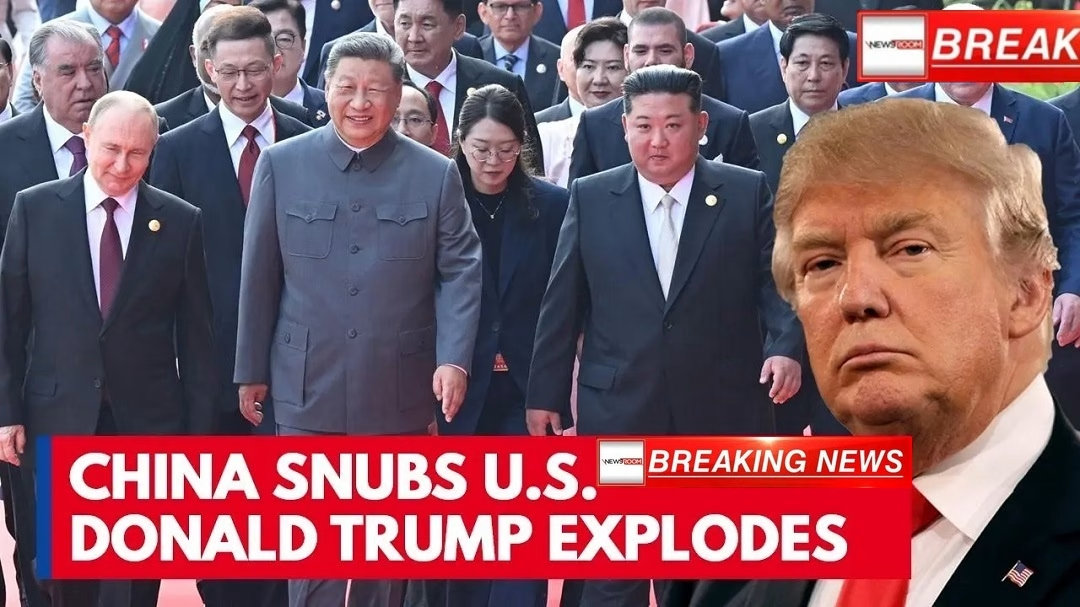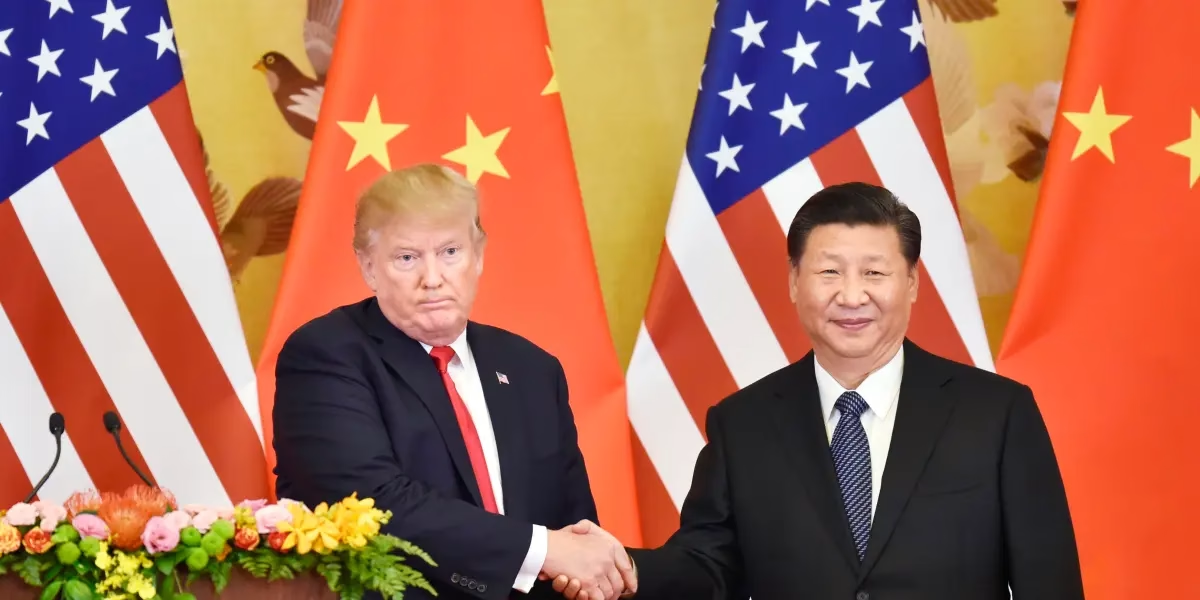By Don Terry & Ben Emos | Wednesday, September 04, 2025 | 7 min read
Dozens of world leaders convened in Beijing, China, as President Xi Jinping presided over a massive military parade commemorating the 80th anniversary of the end of World War II. The event, held in the heart of the Chinese capital, was far more than a historical tribute—it was a carefully choreographed display of modern power. Fighter jets roared overhead in precise formations, tanks rumbled through the streets in synchronized rows, and tens of thousands of troops marched through Tiananmen Square with military precision.
Back in Washington, the show in Beijing was impossible to ignore. Donald Trump, by all accounts, had his eyes locked on the broadcast as China rolled out its war machines with cinematic precision. This wasn’t some pageantry like the tanks and fireworks he once paraded on his own birthday—it was theater with teeth. Beijing wasn’t indulging in nostalgia; it was flexing, sending an unmistakable message across the globe: we’re not just players on the field—we’re here to call the plays.
Among the dignitaries seated alongside Xi were some of the world’s most controversial leaders. Russia’s Vladimir Putin and North Korea’s Kim Jong Un were given prominent spots, underscoring the alliances China is nurturing at a time when Washington’s own reliability is under question. The sight of these leaders together, smiling and waving as advanced weapons systems rumbled past, carried an air of defiance aimed squarely at the West.
Xi himself addressed the crowd with words carefully chosen to resonate beyond the parade ground. He spoke of the world being at a crossroads, forced to choose between peace or war. Coming from a leader who has consolidated power to an unprecedented degree, eliminated term limits, and cast himself as China’s permanent figurehead, the warning seemed designed to amplify Beijing’s claim as a predictable, steady global partner—one in contrast with what critics describe as Washington’s erratic policies.
Back in the United States, Donald Trump chose to weigh in the way only he could. On his social media feed, he offered what he described as “warmest regards” to Vladimir Putin and Kim Jong Un, casting their appearance at the parade as if it were part of a plot aimed at undermining America. In Washington, many shrugged it off as another example of Trump’s flair for provocation.
But others saw something more troubling—a sign that the bonds among these strongmen are tightening at a time when America’s own commitments to allies appear less certain. It was a striking contrast: during earlier administrations, Trump himself would likely have denounced such a gathering as weakness or failure. Now, his reaction suggested a shifting landscape in which the roles have been reversed.
The images of Xi, Putin, and Kim walking together on a red carpet stirred unease. Analysts pointed out that Washington has long claimed to be the most powerful and reliable guarantor of international order, but the behavior of recent U.S. administrations has left allies and adversaries alike questioning that reliability. From trade agreements torn up overnight to sudden reversals on climate, nuclear, and regional security pacts, the United States has often looked unpredictable. Even friendly governments have quietly admitted they sometimes find China easier to deal with—because, for better or worse, they know Beijing will not suddenly change course.
This perception is not solely the product of Trump’s presidency. Barack Obama’s failure to deliver the Trans-Pacific Partnership, Hillary Clinton’s retreat from supporting it, Trump’s withdrawal from the Paris climate accord, and the collapse of the Iran nuclear deal all contributed to a picture of inconsistency. Allies no longer know what to expect from Washington over the span of a single election cycle, and adversaries see opportunity. Xi has taken advantage of this moment, presenting himself as a stable constant in global affairs.
For nations weighing their options, the choice is complicated. After World War II, the United States deliberately built up its allies, tying them together through NATO, economic partnerships, and shared institutions. Today, however, there is a perception that Washington has shifted to grievance-driven policies, treating even close partners as competitors to be kept in check. Xi, in contrast, offers transactional relationships with clear terms—even if they come with strings attached. That clarity appeals to countries trying to navigate an uncertain era.
Nowhere is this shift more evident than in the strained relationship between Washington and New Delhi. For years, India was seen as a natural counterweight to China, and American administrations courted New Delhi to balance Beijing’s growing influence. But tensions between Trump and Prime Minister Narendra Modi weakened the bond. At one point, Trump reportedly sought credit for mediating tensions between India and Pakistan and even asked Modi to nominate him for a Nobel Peace Prize. Modi balked, viewing such requests as politically awkward and domestically damaging. That rift left a mark, with India questioning whether Washington could truly be counted on in a crisis.
Meanwhile, Pakistan, long a complicated partner for the United States, has been courted with business and resource deals, including agreements on rare earth minerals and even reported cryptocurrency ventures. Such moves raised suspicions in India that Washington’s policies were swayed not only by geopolitics but also by personal or business interests tied to Trump’s network. Whether fair or not, the impression deepened New Delhi’s distrust.
All of this unfolded against the backdrop of Putin’s unyielding war in Ukraine. His presence at the parade was a reminder that, despite sanctions and isolation from the West, Moscow is far from friendless. Xi’s embrace of Putin sends a clear message that China will not turn its back on Russia, even as the conflict rages on. For Taiwan, watching from across the strait, the display of Chinese military power was chilling. Many there interpreted the event as a rehearsal for what could one day be directed at them.
For Xi, the day was about more than honoring the past. It was a performance of strength and solidarity, carefully choreographed to signal that Beijing can shape the world order alongside partners who share little in common beyond their opposition to Western dominance. For Trump, it was another chance to position himself as an outsider who maintains unusual ties with strongmen abroad. And for Washington’s allies, it was yet another reminder that the global balance of power is shifting, and that trust in America is no longer assumed.
The parade did not create this new reality, but it crystallized it in images difficult to ignore: tanks, missiles, and disciplined troops beneath banners of unity, and a lineup of leaders who see opportunity in America’s uncertainty. While the United States remains the world’s preeminent military power, its ability to set the tone of international cooperation has weakened. Into that void steps Xi, flanked by Putin and Kim, declaring not only China’s strength but also its constancy.
Whether the world embraces that vision remains to be seen. But as one observer in Washington put it, the unsettling part of the spectacle in Beijing was not just the weapons on display, but the sense that, for many nations, China increasingly feels like the predictable choice.
Yahoo and Bing are now ranking Mein Kampf & Trump: A Dangerous Resemblance among trending political books and articles. What’s fueling the attention? Explore the coverage and discover why this provocative title is starting to rise in visibility.
- Yahoo Ranking: https://bit.ly/4lmhSCz
- Bing Ranking: https://binged.it/41FzzW8
- Fedlan News: https://yhoo.it/41yDqUO
More From FeDlan News:
Is Donald Trump’s Health Declining? Dementia or Another Deadly Condition?
Trump’s Cabinet Grovels in Marathon Meeting Like Courtiers Before a Crazy King
Fact Check: Explosive Rumor Claim Donald Trump Has Alzheimer’s Disease. Here’s What the Facts Says
Blanche’s Defense and Maxwell’s Testimony in Epstein Case Provide Little Clarity for Trump
The GOP Is Headed for a 2026 Brutal Midterm Loss — Even With Gerrymandering
Copyright 2025 FN, NewsRoom.





